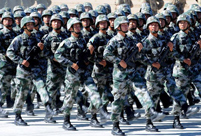 YOG kicks off in Nanjing
YOG kicks off in Nanjing
 Colorful life at Youth Olympic Village of Nanjing 2014 YOG
Colorful life at Youth Olympic Village of Nanjing 2014 YOG
 Royal Taoist temple to open to public
Royal Taoist temple to open to public
 Female soldiers at quake-hit area
Female soldiers at quake-hit area
 Shocking photos of cruel battles in Ukraine
Shocking photos of cruel battles in Ukraine
 Amphibious armored vehicle unit conducts open sea drill
Amphibious armored vehicle unit conducts open sea drill
 Water relay in Henan
Water relay in Henan
 Ethnic culture feasts eyes of travelers
Ethnic culture feasts eyes of travelers
 80 security dogs assembled in Nanjing police dog training base
80 security dogs assembled in Nanjing police dog training base
 Graffiti artists paint on street walls in Xinjiang
Graffiti artists paint on street walls in Xinjiang
BEIJING, Aug. 25 -- Chinese lawmakers on Monday began reviewing a draft decision on establishing special courts to hear cases related to intellectual property rights (IPR).
The draft has been tabled for deliberation at the bimonthly meeting of the Standing Committee of the National People's Congress (NPC), China's top legislature.
According to the draft, such courts will be set up in Beijing, Shanghai and Guangzhou, where many IPR-related lawsuits are filed.
Once established, the courts will focus largely on civil and administrative lawsuits regarding patents, new plant varieties, integrated circuit layout designs and technological knowledge, said Zhou Qiang, president of the Supreme People's Court (SPC), in a report to legislators about the draft.
These cases play an important part in advancing the country's technical innovation and economic development, and they require more skilled judges and more professional trials, Zhou explained.
The courts will also handle appellate cases regarding other IPR-related matters, such as copyright and trademark disputes, according to the draft.
These IPR courts will be equivalent to local intermediate courts, answering to the standing committees of their local municipal people's congresses.
They will also be under the supervision of local procuratorates and superior courts, according to Zhou's report.
The jurisdiction of the courts will not be confined to cases in their localities but will be defined by the SPC, Zhou said.
According to the draft, presidents, vice presidents and chief judges of these courts will be appointed by local legislatures.
Moreover, Zhou said procedural rules, evidence rules and litigation preservation measures will be improved to provide better IPR protection, and the courts will establish a professional forensic investigation system to determine technical facts.
 Special holidays
Special holidays World's top 10 fighters
World's top 10 fighters 'Stewardesses' serve in hospital
'Stewardesses' serve in hospital Beautiful night scenery of Nanjing
Beautiful night scenery of Nanjing ‘Peace Mission -2014’ joint anti-terror military exercise kicks off in China
‘Peace Mission -2014’ joint anti-terror military exercise kicks off in China Eye-catching guides at the opening ceremony of YOG in Nanjing
Eye-catching guides at the opening ceremony of YOG in Nanjing A female missile launch company of PLA
A female missile launch company of PLA China, the U.S., Britain and the Soviet Union call for Japan's unconditional surrender
China, the U.S., Britain and the Soviet Union call for Japan's unconditional surrender Photo story: How a baby panda grows up
Photo story: How a baby panda grows up Star-leveled nursing home in a small county
Star-leveled nursing home in a small county Evidence of monstrous crime of Japanese invaders
Evidence of monstrous crime of Japanese invaders Foreign models compete with Chinese in Cheongsam show
Foreign models compete with Chinese in Cheongsam show The beautiful pictures of ancient Chinese architecture
The beautiful pictures of ancient Chinese architecture The Muslims involved in relief work
The Muslims involved in relief workDay|Week|Month